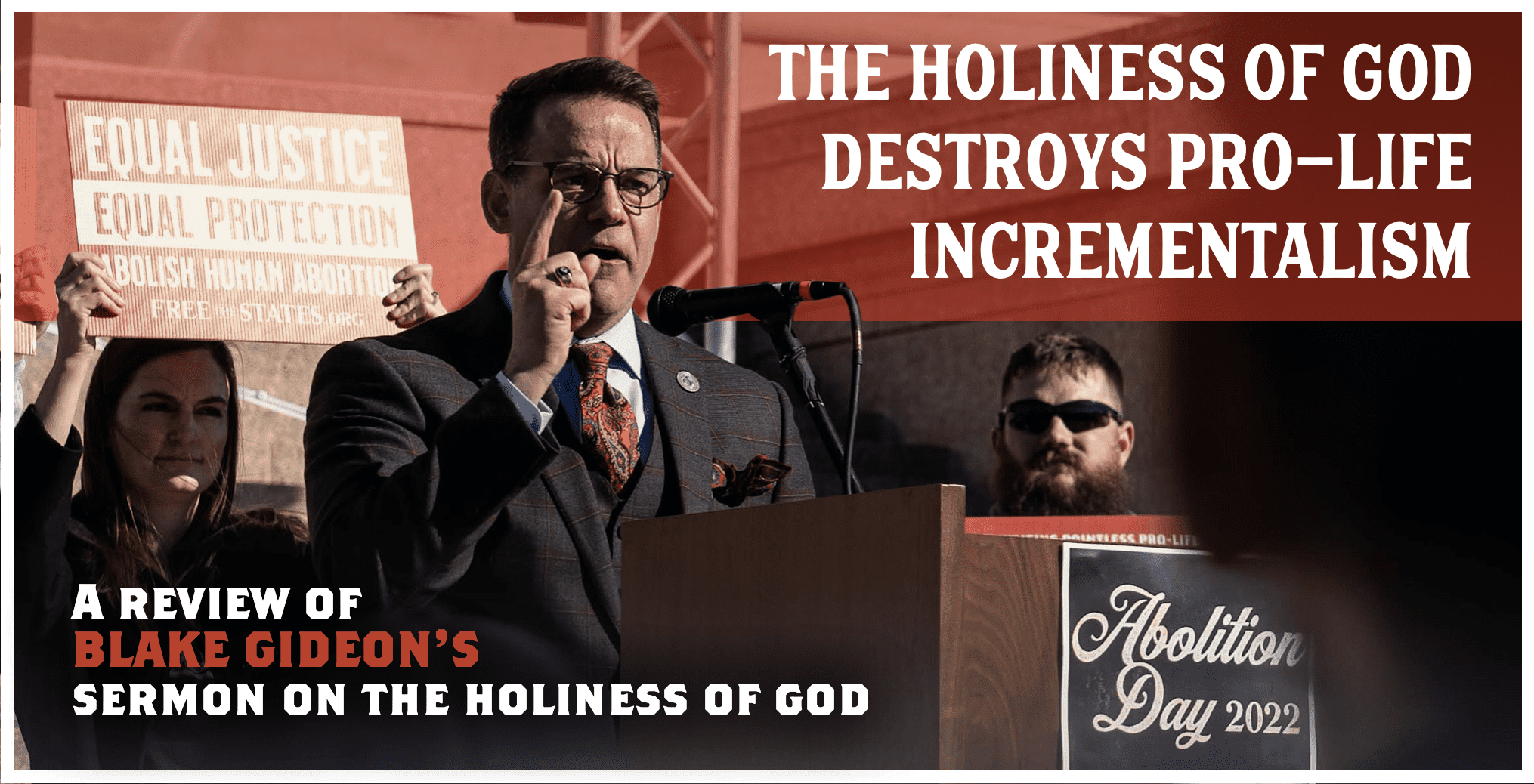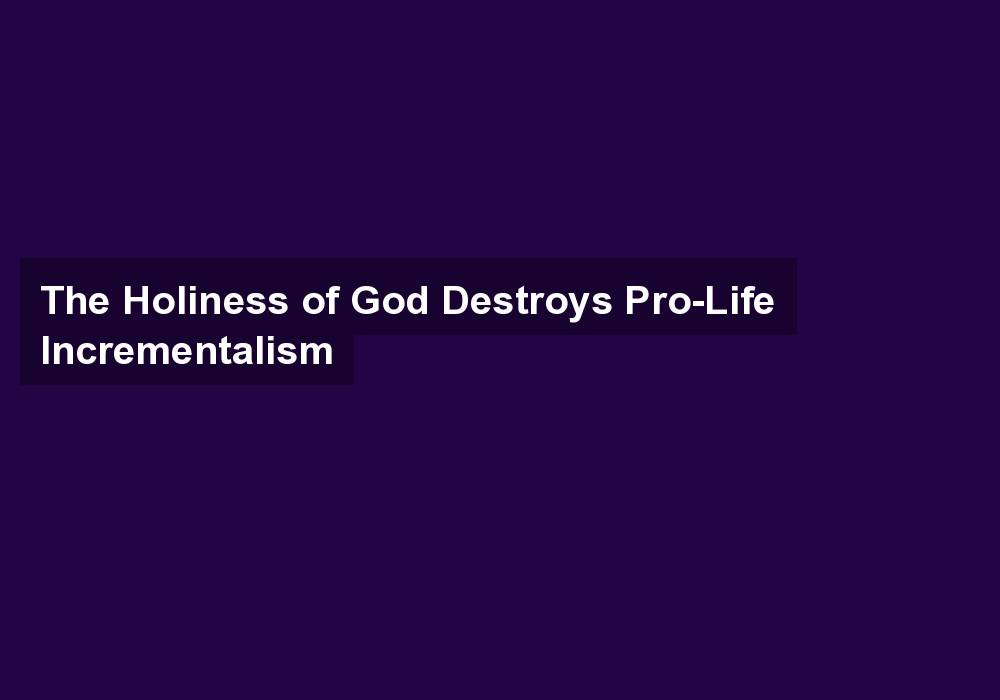
“There’s no issue for debate between immediatism and incrementalism when God has already spoken. The issue is not clarity on the topic–the issue is the holiness of God, and whether or not you bow before the holiness of God.”
So speaks Pastor Blake Gideon (former president of the Baptist General Convention of Oklahoma, and former opponent of abolitionism) in a recent sermon at the Rescue Those conference in Muskogee, Oklahoma.
These words likely strike the staunch incrementalist as arrogant use of God’s authority to argue the point in place of real argumentation. Your reaction is acknowledged. Now, the argument will be made for Pastor Gideon’s point.
What we need is a renewed vision of the holiness of God
“In the year that King Uzziah died I saw the Lord sitting upon a throne, high and lifted up; and the train of his robe filled the temple. Above him stood the seraphim. Each had six wings: with two he covered his face, and with two he covered his feet, and with two he flew. And one called to another and said:
“Holy, holy, holy is the Lord of hosts;
the whole earth is full of His glory!”
And the foundations of the thresholds shook at the voice of him who called, and the house was filled with smoke…”
If there was ever a passage of Scripture whose import was so impossible for finite minds to grasp, this one is it.
This is not surprising, given that holiness is literally the most other-worldly word that can be uttered. It does, after all, mean “set apart”–separate, completely different, other than. Despite our being able to define it, its true meaning really renders it impossible for fallible humans to grapple with. Whatever conception we have of it falls far short of its reality. It is outside of us.
And God is the very source and definition of this holiness.
“Holiness is an awe-inspiring word…He is heavy. He is intense. He is sovereign…He is transcendent. He is high above us. He is other than us…as you can tell, words escape me…my words fall short as I try to describe to you the holiness of God,” says Gideon.
The question to ask about all this that will tie into the discussion of abolitionism and incrementalism is this: what does God’s holiness do? What is the effect of a thrice-holy, absolutely perfect, infinitely separate, inconceivably almighty Being on His finite creation?
The important thing to understand in asking this question is that the separateness of God that we are talking about isn’t at all meant in a Deist sense, in which God is an eternal clockwinder who created the world, wound up its laws of nature, and walked away to let it tick with no further interaction in it at all. No, the separateness we speak of here is in fact far more separate than that. God’s separate otherness is exclusive, and actively so. God is separate, and He is transcendent, but He is not distant–He is present. His holiness proceeds forth from Him and affects everything in existence.
There are two such effects of God’s holiness on Creation.
The first is complete annihilation.
“Mankind shall not see me and live” (Exodus 33:20).
In our own passage earlier cited, we see Isaiah react to his own sense of imminent destruction due to being in the presence of God’s holiness:
“Woe is me! I am ruined…for my eyes have seen the King, the Lord of hosts!” (v5).
But thanks be to God that He sent His Son to stand between us and God’s actively exclusive perfection! Through Christ, we can be saved from the annihilation inherent in God’s holiness. Once we are, the second effect becomes applicable.
It is complete conformity.
“Be holy, for I am holy” (1 Peter 1:16).
“Be perfect, as your heavenly Father is perfect” (Matthew 5:48).
After his unclean lips are cleansed with a coal from the altar, we hear the only other words Isaiah utters in the presence of God’s holiness beyond his assessment of his own woe:
“Here I am! Send me.”
This is immediate obedience.
He didn’t ask any questions. In fact, God hadn’t even told him what his mission was yet. Isaiah was immediately ready to do whatever God was going to tell him. Note that he is still standing in the presence of the glory of the holiness of God–a glory so intense that it should have burned him up on sight. Mere moments ago he was on his knees, aware of the certainty of the rightfulness of his own destruction.
It is with the same intensity of awareness of the glory of the holiness of God that he now conforms himself.
Do we today have this same awful awareness when we hear the commands of Scripture?
Needless now to say, we all need a renewed vision of the holiness of God.
How Should We Then Live?
At this point Gideon asks incrementalists, “In light of what you hear, how in the world could you maintain your current position in light of the holiness of God?”
What this awful awareness of God’s holiness does for the Christian is rule out reliance on anything other than that which proceeds from God’s mouth. We care not for anything on this earth–our sole focus is on the beauty and perfection of God which consumes and conforms us. The communicable attributes of God become our great delight and the lone standard by which we live. Among these attributes is God’s justice. We who have been reconciled to God will love justice and live justly, disregarding all else to the contrary, never being pressured by anything less weighty than God’s glory.
Furthermore, God’s very commands are certainly our sure words of instruction which we could never let go of, or even so much as remove our eyes from – so great and good is their Giver. Among His commands is to establish justice. Evil does not enter into that equation for us–it rather gets consumed before Him. His commands stand pure in and of themselves, all by themselves. Whatever our fleshly eyes see is of no import. Nothing we use to calculate a cunning arithmetic to arrive at what seems to be good can be even entertained. His Words are infinitely too pure and perfect and awesome for us to regard any other possible rubric. Pragmatism is now ruled out. Pragmatism is blown apart like straw before the incomprehensible weightiness of God’s glory. It is incinerated like chaff before the consuming fire of God’s holiness–namely, by His holy command to establish justice. How could pragmatism allure us in light of such holiness?
Trust Scripture, Reject Pragmatism
Of course, the pragmatism we speak of here is the one that very many use to argue for and justify the establishment of INjustice (which is anything short of justice, including parental consent initiatives, pain-capable unborn child protection acts, heartbeat bills, and the like), contrary to God’s law, on the altar of “success” as this incrementalist sees it. It is interesting to note that one is hard pressed to find the incrementalist appealing to Scripture as the basis for his incrementalism. This, however, is not surprising in light of our discussion showing that love of God’s holy commands and worldly pragmatism do not mix. The argument cannot proceed from the first if it is based on the second. Incrementalism is simply not Scriptural.
What we need here is a renewed vision of the holiness of God, flowing from it a new love for the commands of God, and therefore a fixation on establishing justice that won’t be warped by any winds of circumstance or expediency.
Lord help us. Praise Him!


